Social Media Harm Lawsuit Injuries
- Last Updated: June 18th, 2025

Attorney Jessica Paluch-Hoerman, founder of TruLaw, has over 28 years of experience as a personal injury and mass tort attorney, and previously worked as an international tax attorney at Deloitte. Jessie collaborates with attorneys nationwide — enabling her to share reliable, up-to-date legal information with our readers.
Legally Reviewed
This article has been written and reviewed for legal accuracy and clarity by the team of writers and legal experts at TruLaw and is as accurate as possible. This content should not be taken as legal advice from an attorney. If you would like to learn more about our owner and experienced injury lawyer, Jessie Paluch, you can do so here.
Fact-Checked
TruLaw does everything possible to make sure the information in this article is up to date and accurate. If you need specific legal advice about your case, contact us by using the chat on the bottom of this page. This article should not be taken as advice from an attorney.
Key takeaways:
- Social media platforms like Meta can be sued for causing mental health issues among users, especially teens, if addictive designs and a lack of safety measures are proven.
- Evidence of harm includes internal company documents and instances where the platform failed to remove harmful content.
- Leaked research shows social media executives may have known about potential harm but didn't act, which is central to many lawsuits.
Overview of Social Media Harm Lawsuit Injuries
On this page, we’ll provide an overview of the social media harm lawsuits, future implications of the mental health crisis, key allegations in the social media harm lawsuit, and much more.
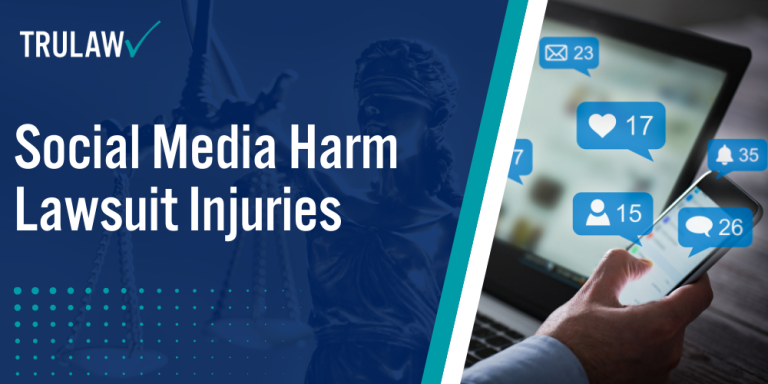
Intro to the Social Media Harm Lawsuits
The rise in social media harm lawsuit injuries highlights increasing concern over the negative effects of young on users.
The key factors contributing toward social media harm lawsuit injuries include, but are not limited to:
- Duty of Care: Plaintiffs claim social media companies failed to protect users from foreseeable harm.
- Causation: Legal actions contend there is a direct link between platform use and mental health issues.
- Social Media Addiction: A common assertion in these cases is the designed addictive nature of these platforms.
- Damages: Seeking compensation for various harms, including costs for medical treatments related to mental health conditions coinciding with excessive social media use.
If you or someone you love has experienced injuries due to social media harm, you may qualify to file a claim.
Contact TruLaw using the chat on this page to find out if you qualify to seek compensation in the Social Media Harm Lawsuit today.
Table of Contents
Social Media Harm Lawsuit: Nationwide Youth Mental Health Crisis
Recent lawsuits have spotlighted the alleged role social media platforms play in exacerbating the youth mental health crisis, with claims of mental health deterioration among young users.
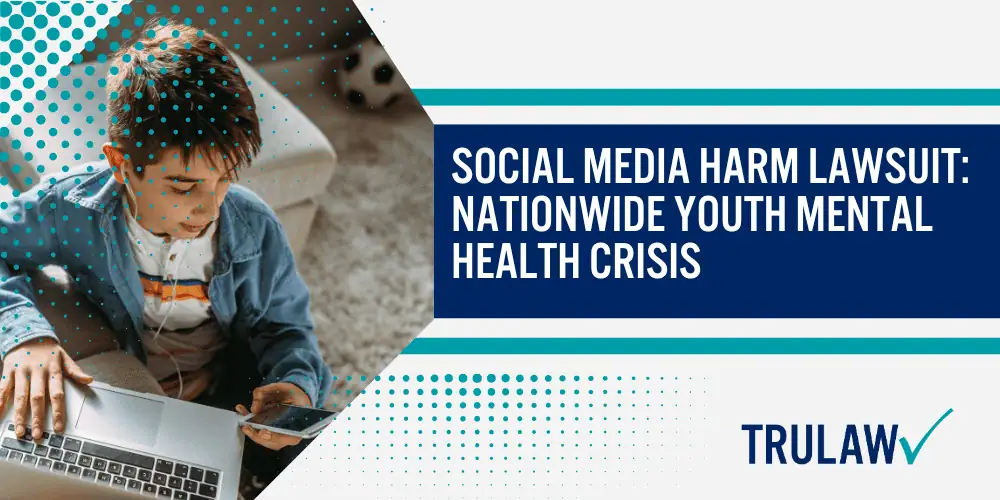
Evidence of Mental Health Decline
The correlation between social media usage and the decline in youth mental health is increasingly coming to light.
Many young individuals experience a range of mental health problems that experts believe could be connected to their digital habits:
- Social comparison fuels feelings of inadequacy and low self-esteem.
- Constant exposure to curated lives may lead to self-harm and suicide attempts,
- The addictive nature of social media is linked to heightened anxiety and depression.
- Notifications and social media “likes” create a feedback loop that can lead to compulsive behavior.
The lawsuits from states, such as those mentioned in the coverage by NPR and AP News, claim that companies have designed platforms that are allegedly deliberately addictive.
Social Media and Body Image
The influence of social media on body image issues is another critical aspect of the current legal social media challenges.
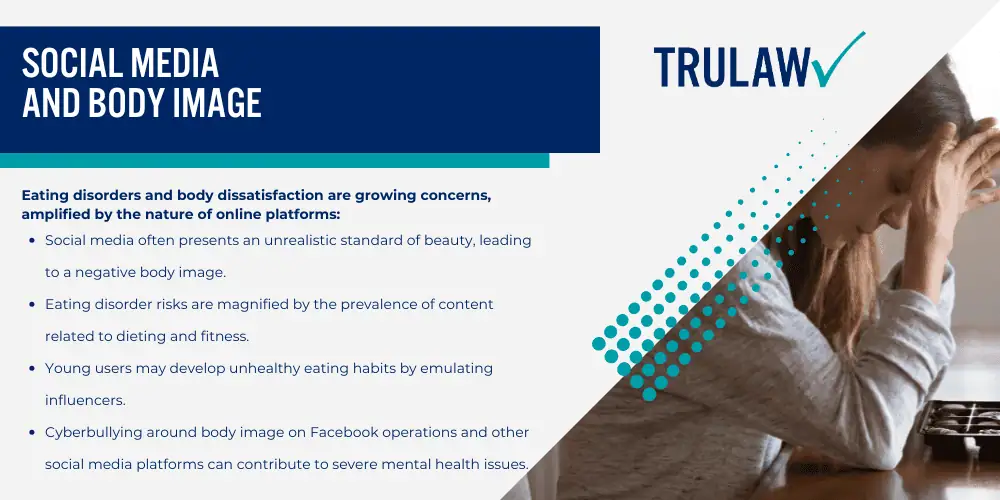
Eating disorders and body dissatisfaction are growing concerns, amplified by the nature of online platforms:
- Social media often presents an unrealistic standard of beauty, leading to a negative body image.
- Eating disorder risks are magnified by the prevalence of content related to dieting and fitness.
- Young users may develop unhealthy eating habits by emulating influencers.
- Cyberbullying around body image on Facebook operations and other social media platforms can contribute to severe mental health issues.
The Legal Landscape and Social Media Companies
Recent legal challenges and changes have significantly impacted how social media companies navigate the legal landscape.
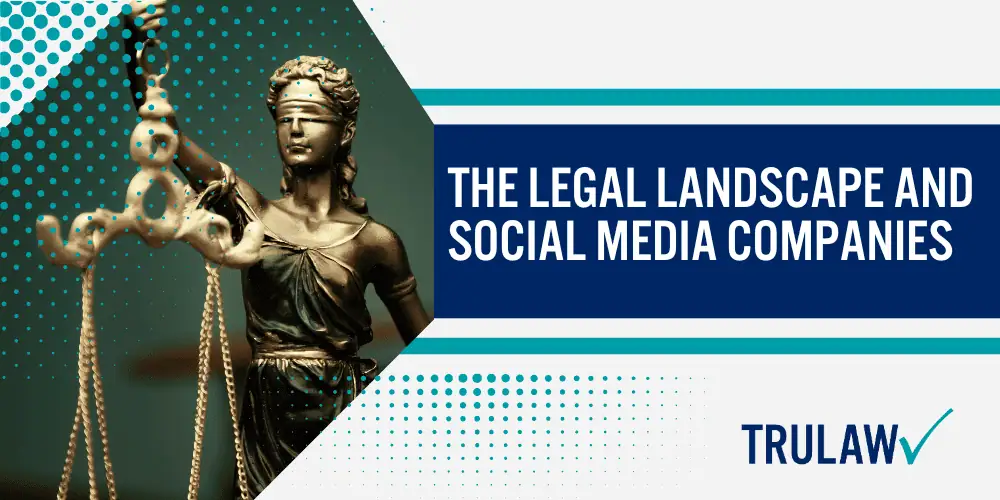
These developments have a considerable influence on the extent to which these companies can be held accountable for user-generated content.
Communications Decency Act
The Communications Decency Act (CDA), particularly Section 230, has played a pivotal role in shaping the legal environment for social media companies.
This federal law protects tech companies from being held liable for the content posted by their users.
Key aspects of the CDA include:
- Immunity Provisions: Shields companies from liability for user content.
- Good Samaritan Clause: Allows companies to moderate user content without incurring legal responsibility.
- Not an Absolute Shield: Does not protect companies from federal criminal liability or intellectual property claims.
Tech Companies’ Accountability
Unease regarding the conduct of major social media companies has led to discussions about their responsibilities and the potential need for accountability.
Aspects where tech companies may be held accountable include:
- Data Privacy: Misuse of user data and privacy violations.
- Content Moderation: Decisions regarding which content to permit or restrict.
- Algorithmic Transparency: Clarity on how content is promoted or suppressed.
- Legal Compliance: Adhering to applicable laws and regulations.
The legal landscape in which a social media company operates is highly dynamic, requiring consistent vigilance from the parent company and associated platforms.
Social Media Addiction and Its Consequences
This section dives into the intricate dynamics of social media addiction, its exploitation of human psychology, and the consequent behavioral health impacts, particularly on teenage girls.
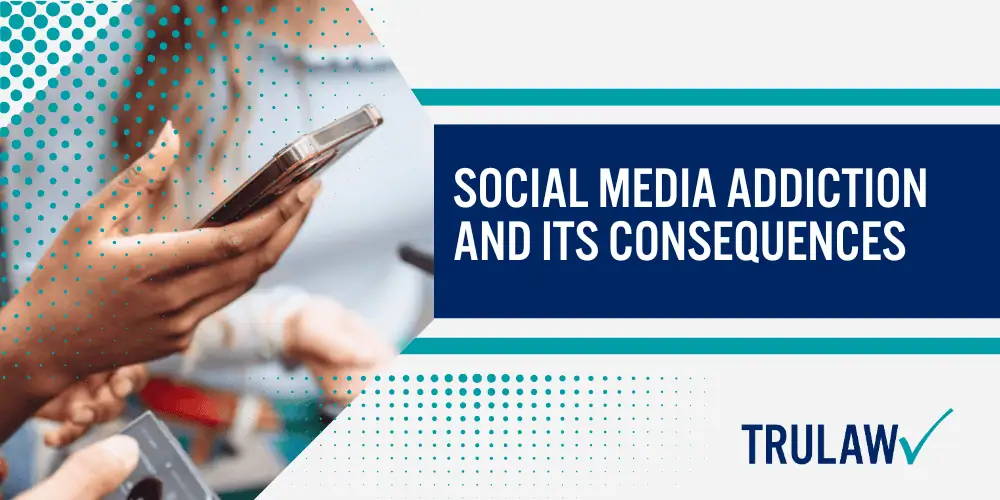
Examination of Social Media Addiction
Social media addiction is characterized by compulsive use of social media platforms, often resulting in significant impairment to an individual’s daily life and functioning.
To understand the scope of this addiction, several factors are identified:
- Excessive time spent on social platforms leads to neglect of real-life interactions and responsibilities.
- Withdrawal symptoms when not using social media, including anxiety and irritation.
- A continuous desire to use social media despite being aware of its negative effects.
- Mood modification or ‘digital high’ sought by users through interactions on social media.
Social Media’s Addictive Nature
Social media platforms are designed to exploit human psychology, creating a loop that encourages repeated engagement.
Below are key characteristics that contribute to their addictive nature:
- Infinite scrolling and autoplays keep users engaged for longer periods.
- Notification systems are designed to trigger a dopamine response akin to rewards.
- Social comparison triggers can have profound effects, especially on teenage girls.
- Curated content algorithms create an echo chamber, reinforcing users’ behavior and beliefs.
Litigation and Plaintiff Arguments in the Social Media Harm Lawsuit
In the unfolding legal saga, plaintiffs assert that social media platforms have fostered addiction and caused pronounced harm, especially among younger users.
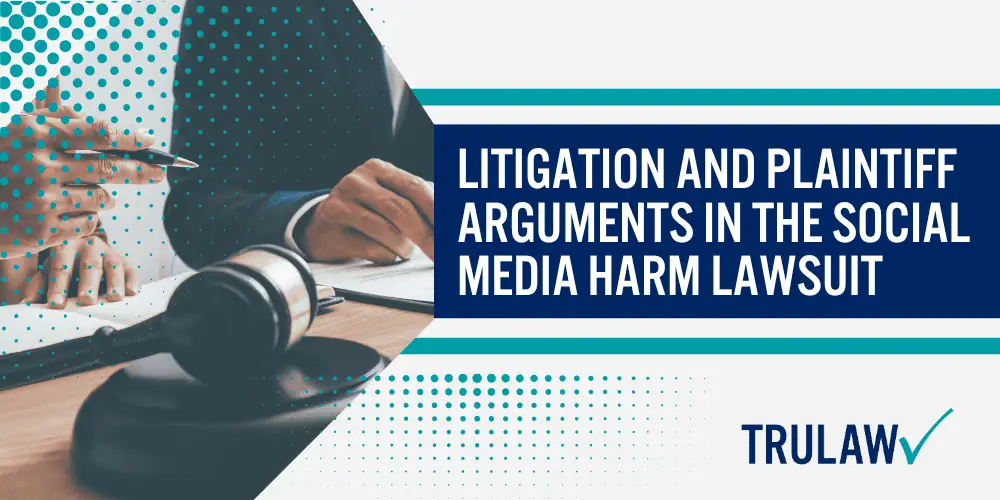
These allegations have culminated in a series of high-profile social media such as the TikTok teen addiction lawsuits.
Arguments Against Social Media Platforms
Plaintiffs in social media lawsuits claim that the companies behind popular platforms systematically prioritize engagement over user well-being.
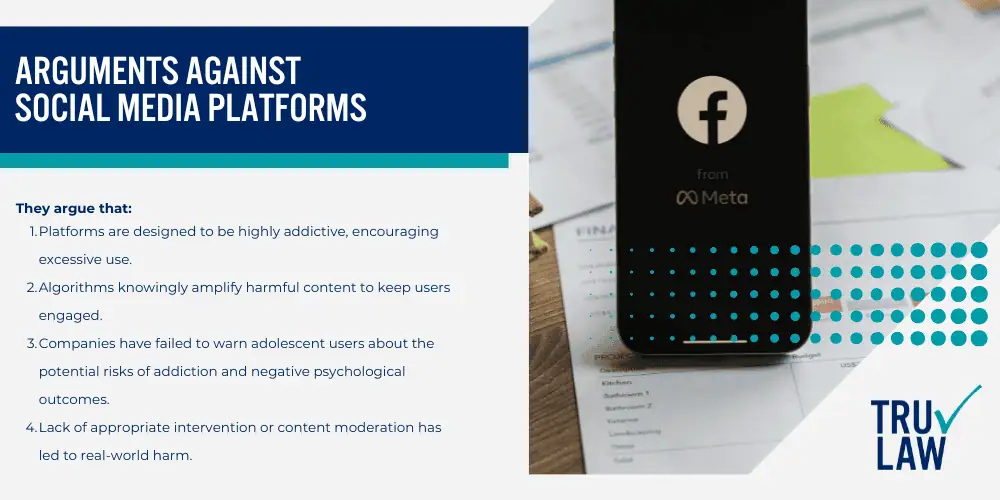
They argue that:
- Platforms are designed to be highly addictive, encouraging excessive use.
- Algorithms knowingly amplify harmful content to keep users engaged.
- Companies have failed to warn adolescent users about the potential risks of addiction and negative psychological outcomes.
- Lack of appropriate intervention or content moderation has led to real-world harm.
Meta Knew of Harmful Effects on Teen Girls
The argument against Meta—formerly known as Facebook—focuses on internal research conducted by the company itself, revealing its awareness of its platforms’ negative impacts on certain demographics, particularly teen girls.
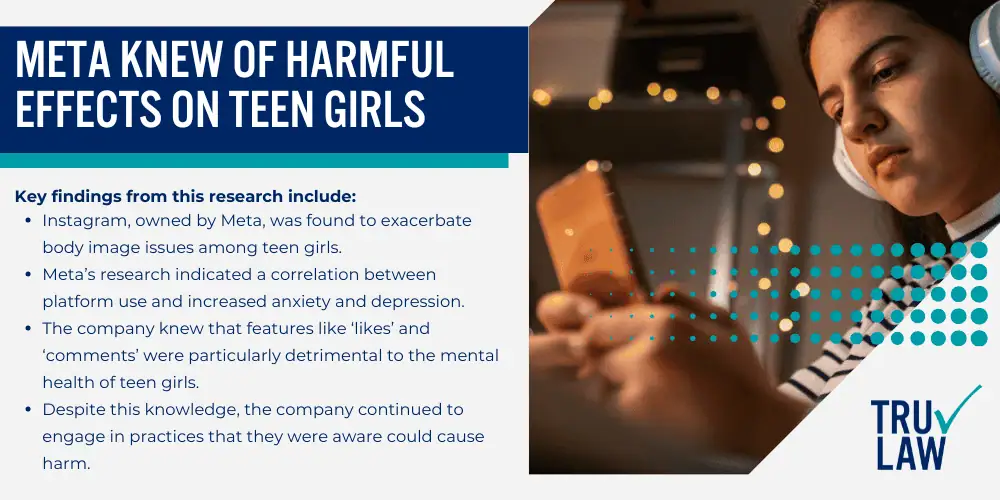
Key findings from this research include:
- Instagram, owned by Meta, was found to exacerbate body image issues among teen girls.
- Meta’s research indicated a correlation between platform use and increased anxiety and depression.
- The company knew that features like ‘likes’ and ‘comments’ were particularly detrimental to the mental health of teen girls.
- Despite this knowledge, the company continued to engage in practices that they were aware could cause harm.
Social Media Platforms Target Teens
In recent litigation, states have raised concerns about social media companies targeting teens, implicating the sustained health of young users and educational systems. 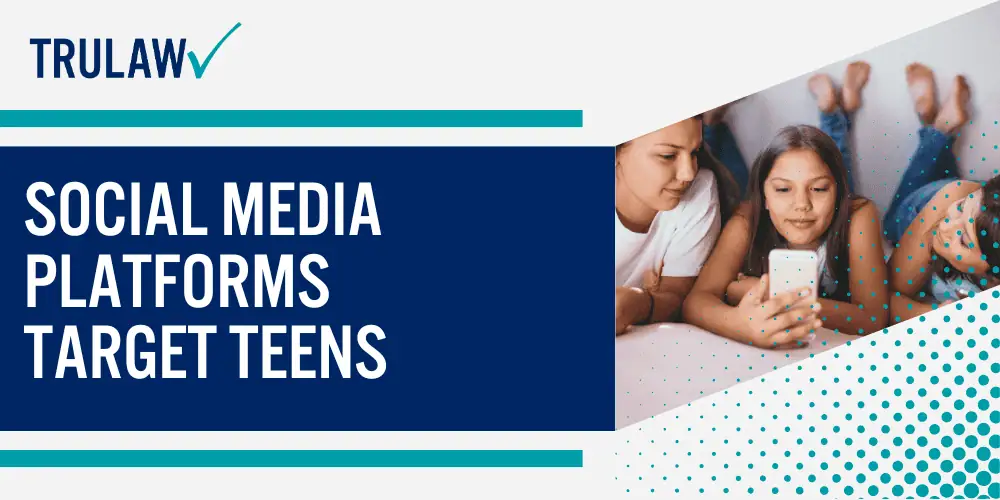
How Social Media Addiction Can Harm Young People
Social media addiction has been associated with detrimental effects on young people’s mental health.
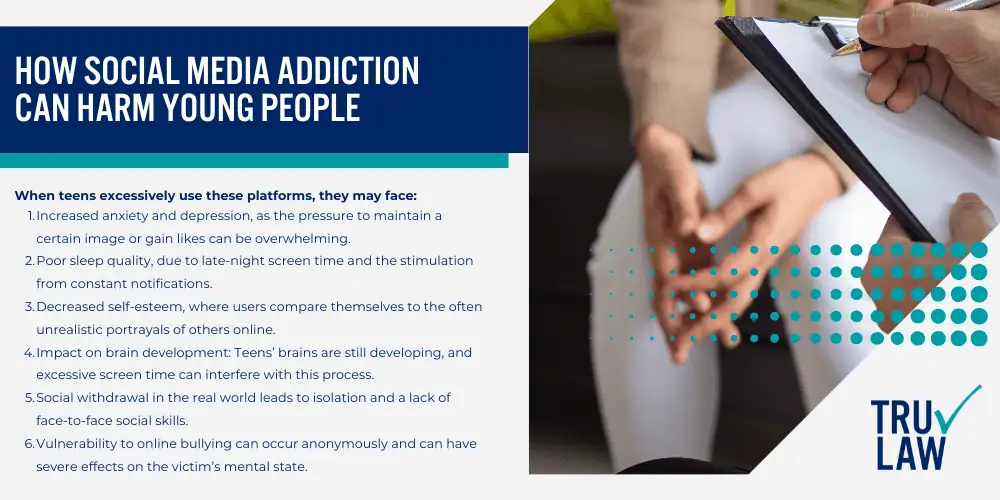
When teens excessively use these platforms, they may face:
- Increased anxiety and depression, as the pressure to maintain a certain image or gain likes can be overwhelming.
- Poor sleep quality, due to late-night screen time and the stimulation from constant notifications.
- Decreased self-esteem, where users compare themselves to the often unrealistic portrayals of others online.
- Impact on brain development: Teens’ brains are still developing, and excessive screen time can interfere with this process.
- Social withdrawal in the real world leads to isolation and a lack of face-to-face social skills.
- Vulnerability to online bullying can occur anonymously and can have severe effects on the victim’s mental state.
The design of these platforms often includes features that make them inherently addictive to young users, fueling these harmful outcomes.
Effects on Students and School Districts
The impact of social media addiction extends beyond individual students to affect entire school districts.
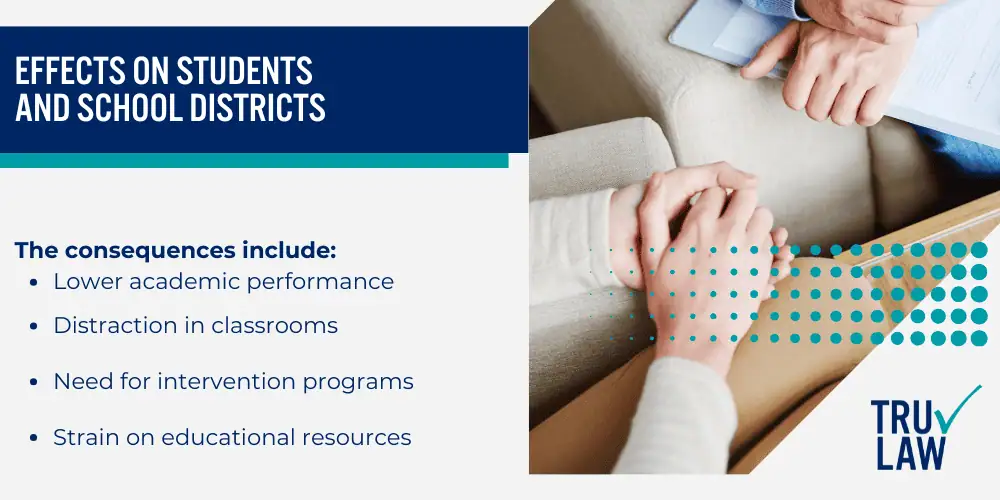
The consequences include:
- Lower academic performance, as students spend more time online instead of focusing on their studies.
- Distraction in classrooms, where notifications and the pull of social media can interfere with learning.
- Need for intervention programs, leading schools to invest in youth mental health programs to support affected students.
- Strain on educational resources, as staff may need to devote time and attention to coping with related disciplinary issues.
Schools are now integral players in combating social media’s negative impact on students’ mental health, highlighting the need for systemic changes in the social media landscape.
MDL Created for Social Media Harm Lawsuit
In response to mounting legal pressures, a Multi-District Litigation (MDL) has been established to consolidate numerous social media harm lawsuits.
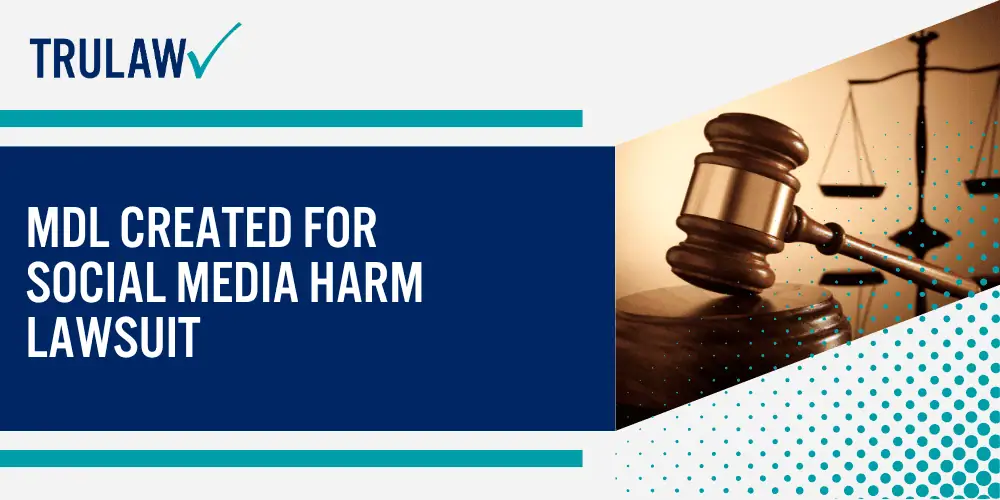
This strategic move aids in managing the financial impact on the judicial system and standardizing the complex proceedings.
The Financial Burden of Lawsuits
Cities and plaintiffs often face significant financial burdens when bringing individual lawsuits against well-funded social media companies.
The institution of an MDL can help mitigate these costs by:
- Centralizing pretrial proceedings to reduce legal expenses.
- Preventing the duplication of discovery, saving time and resources.
- Streamlining the process for social media attorneys to represent a larger client base.
- This allows for a unified approach to battling against robust legal defenses.
School District Sues Meta and Other Social Media Companies
With the rise of mental health concerns among youth, a school district has taken the unprecedented step of suing Meta and other platforms.
Key points of the litigation include:
- Allegations that social media contributes to the decline in student mental health.
- Claims of these platforms being designed to maximize user engagement, to the detriment of adolescents.
- The judicial panel consolidating these cases recognizes the gravity and scale of the social implications involved.
- Social media attorneys are navigating the legal complexities, bringing much-needed expertise to these challenging cases.
Through the consolidating force of the MDL, there is a concerted effort to hold social media companies accountable for their role in what is increasingly viewed as a public health issue.
Public and Institutional Response
Responding to rising concern over social media’s negative impacts on young people, various public entities and educational institutions have formulated strategies and initiated legal actions.
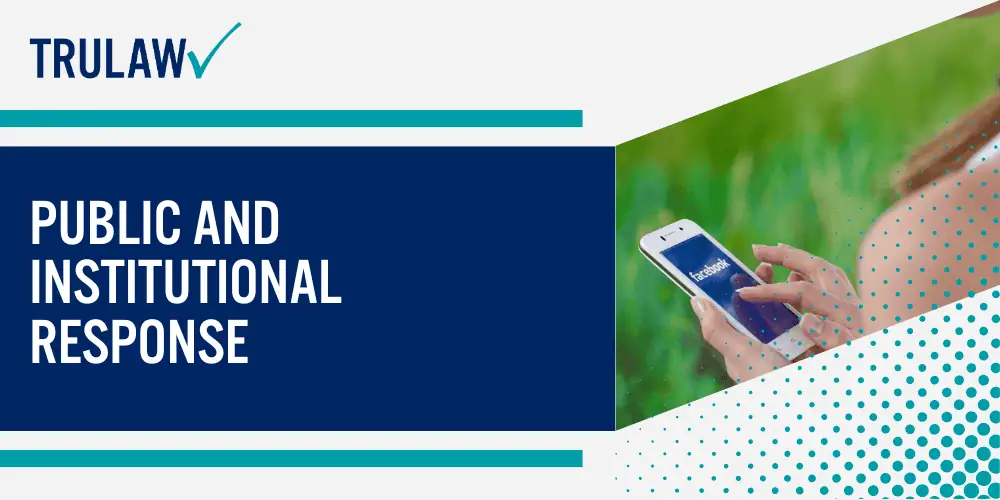
School Initiatives Against Social Media Impact
Seattle Public Schools have taken a proactive stance to mitigate the impact of social media on students.
Specific measures include:
- Conducting awareness workshops for students about the potential risks of excessive social media use.
- Implementing monitoring tools to help educators understand social media’s influence.
- Offering counseling services to support students dealing with social media-related issues.
- Collaborating with parents to establish healthy digital habits at home.
Federal Inquiries and Actions
In response to growing concerns about the impact of social media on young adults, federal entities are taking significant steps to mitigate potential harms.
Efforts to protect and inform the public include commissioning research to understand the effects better, engaging in legal battles, and demanding more from social media giants like Meta Platforms.
Federal entities have ramped up their efforts to address the social media crisis among young adults by:
- Commissioning studies to investigate the extent of social media harm.
- A federal judge has been involved in critical legal decisions impacting these cases.
- Legislators have interrogated Meta Platforms regarding their policies on user protection.
- Proposing new regulations that demand greater transparency and accountability from social media companies.
The Future of Social Media Regulation
The social media landscape is evolving, with imminent regulatory changes and a reckoning with the crucial role of user engagement in the regulatory process.
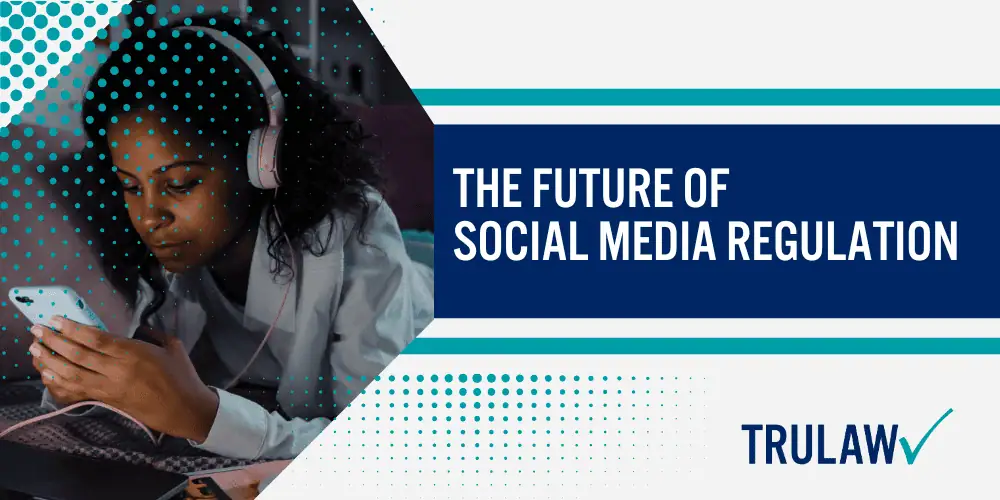
Predictions for Regulatory Changes
Regulatory measures are anticipated to pivot towards ensuring online well-being and addressing the complexities of the online world.
Anticipated changes may include:
- Imposition of stricter data privacy laws to safeguard user information.
- Introduction of content moderation policies that balance freedom of speech with the need to curb harmful content.
- An expanded role for government oversight agencies in monitoring social media platforms.
- Transparency reporting from social media companies regarding algorithms and content management is required.
The Role of User Engagement in Regulation
User engagement is poised to be pivotal in shaping social media regulation, potentially leading to more user-centric policies.
Key factors in this development might encompass:
- A push for features that promote meaningful social interactions while minimizing addictive behaviors.
- Development of tools that allow users more control over their online experience.
- Encouraging digital literacy to empower users to navigate the social media landscape responsibly.
- Consultation with user advocacy groups to inform policy decisions.
Social Media Harm Lawsuits Frequently Asked Questions
-
Calculating a payout typically involves assessing the extent of emotional and financial damage.
Attorneys may scrutinize medical costs, earnings loss, and mental health impacts’ severity to estimate settlement values.
-
Law firms increasingly leverage arguments based on the duty of care that social media companies allegedly neglect.
They argue that platforms failed to protect users from known risks, thus breaching their responsibility.
-
Legal claims often rely on expert testimony and scientific research to establish a link between social media use and mental health issues.
Plaintiff claims are strengthened when they directly correlate platform use and psychological harm.
-
Some schools have initiated legal actions, alleging that social media companies have created environments harmful to students’ mental health.
They are seeking both remedies and policy changes to enhance student well-being.

Managing Attorney & Owner
With over 25 years of legal experience, Jessica Paluch-Hoerman is an Illinois lawyer, a CPA, and a mother of three. She spent the first decade of her career working as an international tax attorney at Deloitte.
In 2009, Jessie co-founded her own law firm with her husband – which has scaled to over 30 employees since its conception.
In 2016, Jessie founded TruLaw, which allows her to collaborate with attorneys and legal experts across the United States on a daily basis. This hypervaluable network of experts is what enables her to share the most reliable, accurate, and up-to-date legal information with our readers!
Additional Social Media Harm Lawsuits resources on our website:
Here, at TruLaw, we’re committed to helping victims get the justice they deserve.
Alongside our partner law firms, we have successfully collected over $3 Billion in verdicts and settlements on behalf of injured individuals.
Would you like our help?
At TruLaw, we fiercely combat corporations that endanger individuals’ well-being. If you’ve suffered injuries and believe these well-funded entities should be held accountable, we’re here for you.
With TruLaw, you gain access to successful and seasoned lawyers who maximize your chances of success. Our lawyers invest in you—they do not receive a dime until your lawsuit reaches a successful resolution!
AFFF Lawsuit claims are being filed against manufacturers of aqueous film-forming foam (AFFF), commonly used in firefighting.
Claims allege that companies such as 3M, DuPont, and Tyco Fire Products failed to adequately warn users about the potential dangers of AFFF exposure — including increased risks of various cancers and diseases.
Depo Provera Lawsuit claims are being filed by individuals who allege they developed meningioma (a type of brain tumor) after receiving Depo-Provera birth control injections.
A 2024 study found that women using Depo-Provera for at least 1 year are five times more likely to develop meningioma brain tumors compared to those not using the drug.
Suboxone Tooth Decay Lawsuit claims are being filed against Indivior, the manufacturer of Suboxone, a medication used to treat opioid addiction.
Claims allege that Indivior failed to adequately warn users about the potential dangers of severe tooth decay and dental injuries associated with Suboxone’s sublingual film version.
Social Media Harm Lawsuits are being filed against social media companies for allegedly causing mental health issues in children and teens.
Claims allege that companies like Meta, Google, ByteDance, and Snap designed addictive platforms that led to anxiety, depression, and other mental health issues without adequately warning users or parents.
Transvaginal Mesh Lawsuits are being filed against manufacturers of transvaginal mesh products used to treat pelvic organ prolapse (POP) and stress urinary incontinence (SUI).
Claims allege that companies like Ethicon, C.R. Bard, and Boston Scientific failed to adequately warn about potential dangers — including erosion, pain, and infection.
Bair Hugger Warming Blanket Lawsuits involve claims against 3M — alleging their surgical warming blankets caused severe infections and complications (particularly in hip and knee replacement surgeries).
Plaintiffs claim 3M failed to warn about potential risks — despite knowing about increased risk of deep joint infections since 2011.
Baby Formula NEC Lawsuit claims are being filed against manufacturers of cow’s milk-based baby formula products.
Claims allege that companies like Abbott Laboratories (Similac) and Mead Johnson & Company (Enfamil) failed to warn about the increased risk of necrotizing enterocolitis (NEC) in premature infants.
Here, at TruLaw, we’re committed to helping victims get the justice they deserve.
Alongside our partner law firms, we have successfully collected over $3 Billion in verdicts and settlements on behalf of injured individuals.
Would you like our help?
